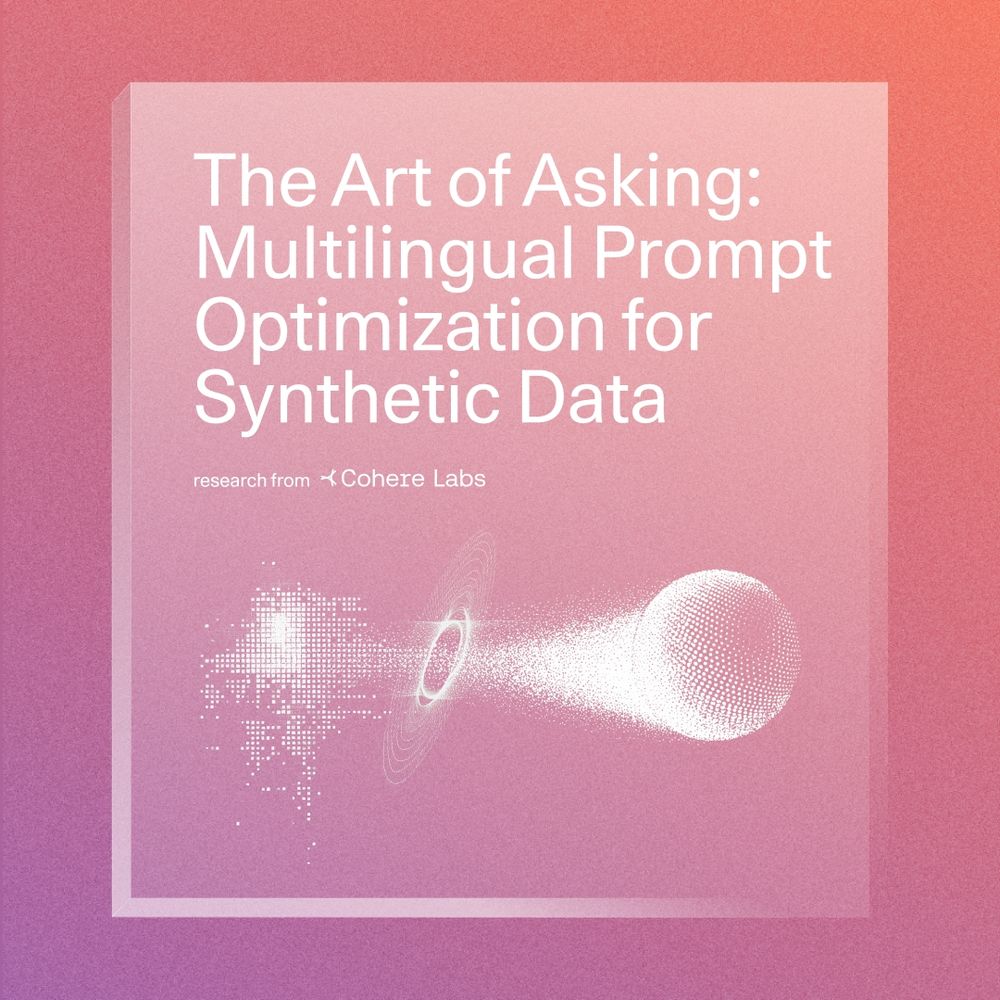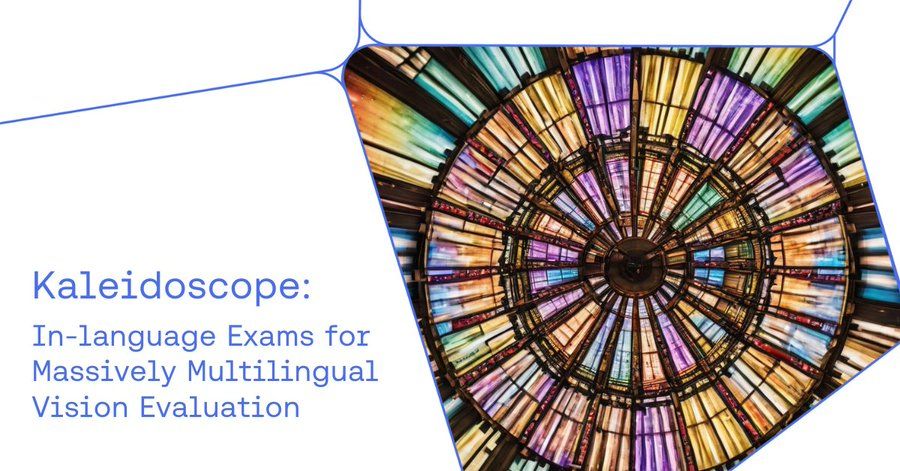
We’re thrilled to announce that some of our research will be presented at @emnlpmeeting.bsky.social next week! 🥳
If you’re attending the conference, don’t miss the chance to explore our work and connect with our team.
@juliakreutzer.bsky.social
NLP & ML research @cohereforai.bsky.social 🇨🇦

We’re thrilled to announce that some of our research will be presented at @emnlpmeeting.bsky.social next week! 🥳
If you’re attending the conference, don’t miss the chance to explore our work and connect with our team.

How well do LLMs handle multilinguality? 🌍🤖
🔬We brought the rigor from Machine Translation evaluation to multilingual LLM benchmarking and organized the WMT25 Multilingual Instruction Shared Task spanning 30 languages and 5 subtasks.

🌍Most multilingual instruction data starts as English and translation can’t capture cultural nuance or linguistic richness
What if we optimized prompts instead of completions?
That’s the focus of our most recent work on prompt space optimization for multilingual synthetic data🗣️
The next generation of open LLMs should be inclusive, compliant, and multilingual by design. That’s why we @icepfl.bsky.social @ethz.ch @cscsch.bsky.social ) built Apertus.
03.09.2025 09:26 — 👍 25 🔁 8 💬 2 📌 2Let's do the venue justice. Very excited for today's multilingual workshops at #COLM2025 💙
10.10.2025 12:23 — 👍 10 🔁 1 💬 0 📌 0Looking forward to tomorrow's #COLM2025 workshop on multilingual data quality! 🤩
09.10.2025 23:16 — 👍 6 🔁 3 💬 0 📌 0Ready for our poster today at #COLM2025!
💭This paper has had an interesting journey, come find out and discuss with us! @swetaagrawal.bsky.social @kocmitom.bsky.social
Side note: being a parent in research does have its perks, poster transportation solved ✅

We’re not your average lab. We’re a hybrid research environment dedicated to revolutionizing the ML space.
And we’re hiring a Senior Research Scientist to co-create with us.
If you believe in research as a shared, global effort — this is your chance.
💡A collaborative➕diverse team is key. In real life as in the LLM world 💪🦾
Check out our latest work that builds on this insight. 👇
Breaking into AI research is harder than ever, and early-career researchers face fewer chances to get started.
Entry points matter.
We started the Scholars Program 3 years ago to give new researchers a real shot — excited to open applications for year 4✨

While effective for chess♟️, Elo ratings struggle with LLM evaluation due to volatility and transitivity issues.
New post in collaboration with AI Singapore explores why Elo falls short for AI leaderboards and how we can do better.

COLM 2025 is now accepting applications for:
Financial Assistance Application -- docs.google.com/forms/d/e/1F...
Volunteer Application -- docs.google.com/forms/d/e/1F...
Childcare Financial Assistance Application -- docs.google.com/forms/d/e/1F...
All due by July 31
🍋 Squeezing the most of few samples - check out our LLMonade recipe for few-sample test-time scaling in multitask environments.
Turns out that standard methods miss out on gains on non-English languages. We propose more robust alternatives.
Very proud of this work that our scholar Ammar led! 🚀
🚨LLM safety research needs to be at least as multilingual as our models.
What's the current stage and how to progress from here?
This work led by @yongzx.bsky.social has answers! 👇
🚧No LLM safety without multilingual safety - what is missing to closing the language gap? And where does this gap actually originate from?
Answers 👇
Multilingual 🤝reasoning 🤝 test-time scaling 🔥🔥🔥
New preprint!
@yongzx.bsky.social has all the details 👇

1/ Science is only as strong as the benchmarks it relies on.
So how fair—and scientifically rigorous—is today’s most widely used evaluation benchmark?
We took a deep dive into Chatbot Arena to find out. 🧵
Thank you @rapha.dev 😊 hope we can establish going a little more into depth rather than just focusing on breadth (massive multilinguality) with evals.
24.04.2025 00:08 — 👍 1 🔁 0 💬 0 📌 0🤓MT eyes on multilingual LLM benchmarks 👉 Here's a bunch of simple techniques that we could adopt easily, and in total get a much richer understanding of where we are with multilingual LLMs.
🍬Bonus question: how can we spur research on evaluation of evaluations?
Tired of messy non-replicable multilingual LLM evaluation? So were we.
In our new paper, we experimentally illustrate common eval. issues and present how structured evaluation design, transparent reporting, and meta-evaluation can help us to build stronger models.
🎯In order to keep advancing mLLM models, we need to advance our evaluation methods.
We need meta-evaluation research to think beyond one-fits-all automatic evaluation and develop richer assessments in human evaluation, and iterate to adapt them to advances in capabilities. 🔄

Checklist for multilingual LLM evaluation
🤔Yes, none of these principles are novel or the techniques particularly sophisticated.
Despite their effectiveness, none of them are standard practice.
✔️We’ve compiled a checklist to help incorporate them in model evaluations.

Table comparing model scores under different prompt templates.
(5) Advancing reproducibility through transparency 🪟
Current mLLM evaluations are near impossible to reproduce, due to intransparency of evaluation configurations (incl. task formulation as in the example below). We argue for open evaluation releases that include model outputs and their scores.

Diagram breaking down win rate comparisons across buckets of prompt length
(4) Conducting richer analyses 🔬
Aggregate benchmark metrics do not provide insights into what differentiates the outputs of two models - yet this is often the first step in human evaluation. For example, we can group evaluation prompts by length or category.

Table displaying model ranking changes depending on language resourcedness and task focus
(3) Aggregating responsibly 🏗️
How we aggregate results across tasks and languages informs the interpretation of model comparisons. Uniform weighting is not necessarily fair due to differences in training distribution (e.g. language or task support).

Diagram that shows the significance of win rate differences in relation to sample sizes
(2) Measuring significance, power and effect size 🔋
Generative evaluations for mLLMs rarely consider significance of results, statistical power of the test setup or effect sizes. We illustrate how these can be helpful to reporting model differences more meaningfully.

Diagram relating prompt translation quality to a change in win rate differences across languages
(1) Treating synthetic data with care 💅
Translations are a common way to expand evaluation sets to new languages. We demonstrate that prompt translation can cause changes in win rates, with magnitudes depending on translation quality and generative models.
💡… turns out that by adopting practices from MT evaluations we can improve the expressiveness of generative multilingual LLM (mLLM) evaluations. Examples in thread below👇
17.04.2025 10:56 — 👍 2 🔁 0 💬 1 📌 0
Screenshot of the paper header with title and author list and affiliations
📖New preprint with Eleftheria Briakou @swetaagrawal.bsky.social @mziizm.bsky.social @kocmitom.bsky.social!
arxiv.org/abs/2504.11829
🌍It reflects experiences from my personal research journey: coming from MT into multilingual LLM research I missed reliable evaluations and evaluation research…

🚀 We are excited to introduce Kaleidoscope, the largest culturally-authentic exam benchmark.
📌 Most VLM benchmarks are English-centric or rely on translations—missing linguistic & cultural nuance. Kaleidoscope expands in-language multilingual 🌎 & multimodal 👀 VLMs evaluation